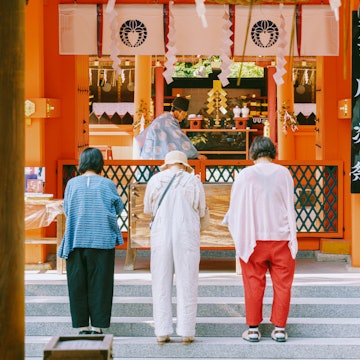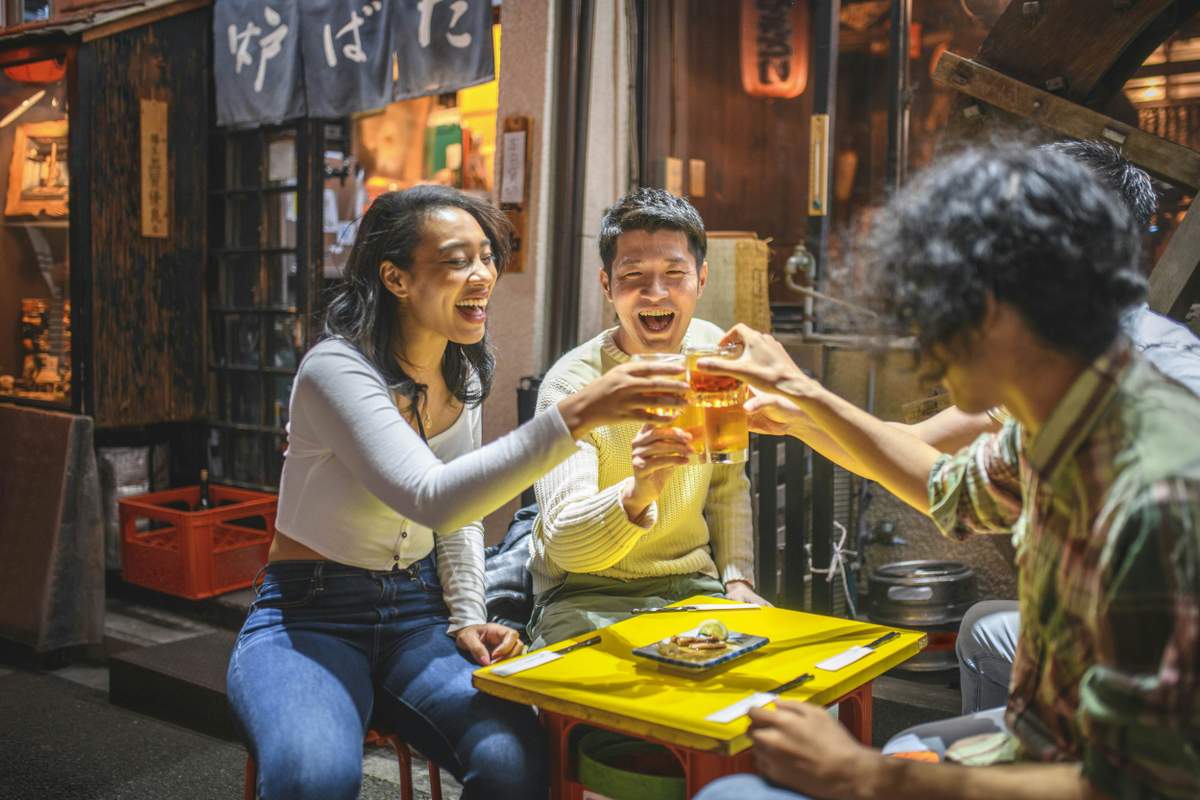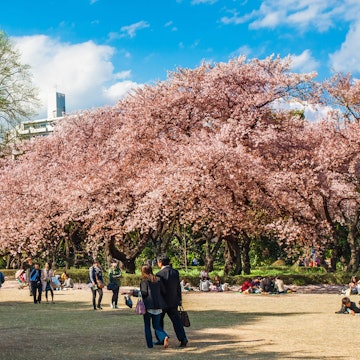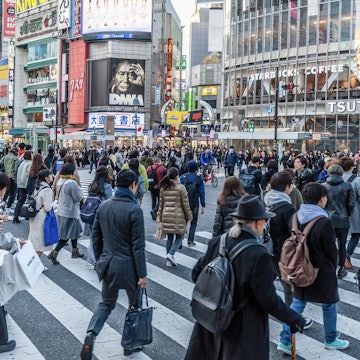

You can go surfing on Izu Oshima within striking distance of Tokyo © Yoshiyoshi Hirokawa / Getty Images
Whether you are a first-time visitor to Tokyo or know the city well, there are plenty of surprises waiting on the capital’s doorstep.
The temples and shrines of Nikkō and Kamakura offer a window into Japanese history, while Mt Takao, Hakone, and Izu Oshima Island provide a natural contrast to Tokyo’s crowded, urban heart.
All of these spots can be reached within an hour or two by train from Tokyo. If you travel on three consecutive days, you may be able to save a few yen by using the Tokyo Wide Pass. Here are our top picks for a day trip from Tokyo.

1. Meet the Big Buddha of Kamakura
Travel time: One hour
From 1185 to 1333, the coastal town of Kamakura temporarily replaced Kyoto as the then seat of power in Japan. It’s the remnants of that era that make modern-day Kamakura such a compelling day trip from Tokyo, with sights like the magnificent Tsurugaoka Hachimangu Shrine and a varied collection of Zen temples.
The latter includes Japan’s oldest Zen monastery, Kencho-ji, and Hokoku-ji and its small bamboo forest. However, the highlight at Kamakura is the Daibutsu, an 11.3m-high (37ft) bronze statue of Buddha resting serenely at Kotoku-in Temple since being cast in 1252.
How to get to Kamakura from Tokyo: Take the JR Yokosuka Line from Tokyo Station to Kamakura Station. Once there, most of Kamakura’s sights are walkable, but for the Big Buddha at Kotoku-in Temple take the retro Enoden tram three stops to Hase, from where it’s a five-minute walk north.
2. Experience island life on Izu Oshima
Travel time: 1 hour 45 minutes
Few travelers realize it but thanks to the Izu Island chain and remote Ogasawara archipelago, Tokyo technically has islands within its city limits. The closest to the mainland, Izu Oshima, makes for an active day away from the city.
To get a sweat on, hike around the crater of volcanic Mt Mihara, Oshima’s most dominant peak at 2487ft (758m), then soak in the outdoor hot-spring baths at Miharayama.
Alternatively, rent a bicycle and circumnavigate the 91 sq mile island, taking in coastal hot springs on route, distinctive rock formations, and (from January to March) Oshima’s signature camelias.
How to get to Oshima Island from Tokyo: Take a high-speed jet ferry from Tokyo’s Takeshiba Terminal, which is next to Takeshiba Station on the Yurikamome Line or a short walk south of JR Hamamatsucho Station on the Yamanote Line. Ferries arrive at Oshima’s Motomachi or Okata ports, from where you can catch buses to the main sights or rent a bicycle or car.

3. Visit Nikkō’s spectacular Tōshō-gū shrine
Travel time: 1 hour 45 minutes
You can see shrines in Tokyo, but Nikkō is on a whole different level. The UNESCO World Heritage-designated Tōshō-gū Shrine is the resting place of the first Edo-era shogun, Tokugawa Ieyasu.
After an approach lined by towering cedars, the highlights include a five-story pagoda and imposing gateways like the Yomei-mon, a riot of black lacquer and gilding that’s adorned with vibrant carvings of birds and dragons.
Elsewhere in the complex are the spectacular gilded buddhas at Rinnō-ji, plus subtle decorations like the carvings of the three monkeys of "see, speak and hear no evil" fame.
How to get to Nikkō from Tokyo: Nikkō has two neighboring stations: JR Nikkō and Tōbu Nikkō. The quickest route from Tokyo is to use Tōbu Railway’s Kegon or Spacia X limited-express trains between Asakusa and Tobu Nikkō, although a joint JR-Tōbu service also starts from Shinjuku. Buses connect both Nikkō and Tōbu-Nikkō stations to Tōshō-gū and other key sights. Alternatively, it’s about a 20-minute walk from the stations to Tōshō-gū.
4. Escape to Mount Takao for hikes, views and clear air
Travel time: 55 minutes
You don’t have to go to all the way to Hakone for great Fuji views. When the weather is clear, Fuji looks resplendent from the top of 599m (1965ft) Mt Takao.
Still inside Tokyo, Takao is arguably the easiest way to experience Japan’s natural surrounds. The hike up only takes 90 minutes to two hours but it can be made even shorter by taking a cable car halfway up.
On the way, you’ll pass through Yakuō-in Temple, a center for ascetic training that holds a fire walking festival on the second Sunday of every March.
Toward the peak, Takao’s cherry blossoms are a popular spot for hanami (flower-viewing) picnics in spring, while the seasonal Beer Mount beer garden at the top is ideal for a post-walk thirst quencher from mid-June to mid-October.
How to get to Takao from Tokyo: Ride the Keio Line special-express from Shinjuku to Takaosan-guchi Station. From there, you are a five-minute walk from either the trailhead at the foot of Takao or the cable car, which can take you halfway up the peak.

5. Immerse yourself in the hot springs and scenery of Hakone
Travel time: 1 hour 20 minutes
Mountainous Hakone is one of the most popular side trips from Tokyo. A jaunt here delivers up-close views of Mt Fuji and the steaming sulfur vents of Owakudani (Great Boiling Valley), plus hot-spring bathing complexes like Yunessun, and even an outdoor art museum home to work by Rodin and Picasso.
While Hakone can be explored in a day, consider an overnighter at a ryokan (these traditional inns have their own hot spring baths).
How to get to Hakone from Tokyo: Catch Odakyu’s limited-express Romancecar from Shinjuku Station to Hakone-Yumoto Station. You’ll need a reserved seat, though outside of holiday periods you can buy that at the station on the day of travel. To save yen, also get a Hakone Freepass. It covers the return train trip and gives two or three days of unlimited use of the buses, ropeways, and other transportation networks you’ll need to get around Hakone.
















